Literature Review: Palliative Care for Terminal Conditions in the UK
VerifiedAdded on 2023/06/13
|18
|7169
|472
Literature Review
AI Summary
This literature review explores palliative care in the UK, focusing on its effectiveness in supporting individuals with terminal conditions. It begins by defining palliative care as a service designed to enhance the quality of life for individuals at the end of life, highlighting the UK's high ranking in palliative care quality. The review addresses the challenges and impacts of palliative care, including managing pain, addressing emotional needs, and ensuring dignity. Strategies to minimize these challenges, such as integrated care teams and specialized palliative medicine, are also evaluated. The review emphasizes the importance of a holistic approach, considering psychological, social, and spiritual support. It also discusses ethical issues and the need for policies that support palliative care, ultimately aiming to understand and improve the support provided to those facing terminal conditions in the UK. Desklib offers access to this and other solved assignments for students.

Palliative care in the UK
Paraphrase This Document
Need a fresh take? Get an instant paraphrase of this document with our AI Paraphraser
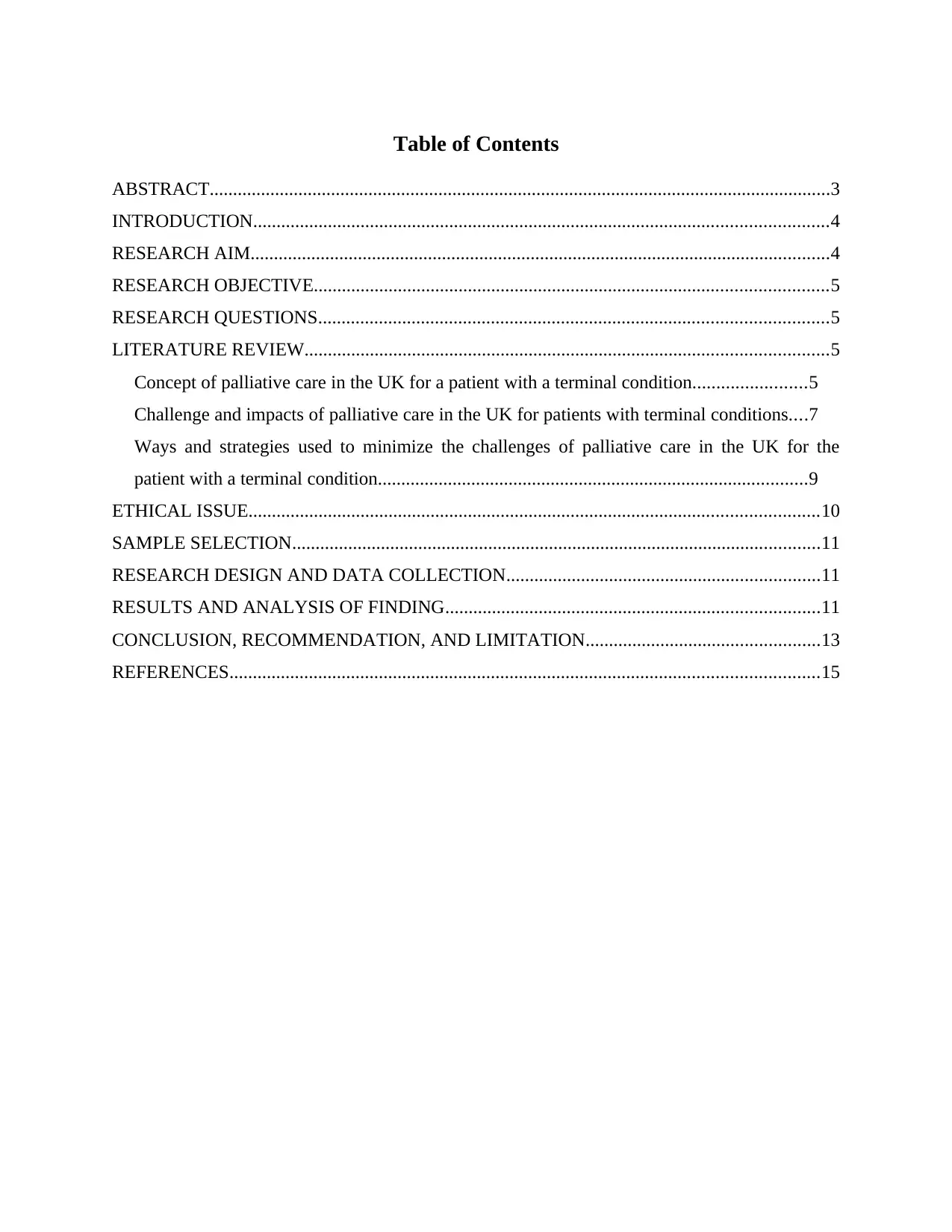
Table of Contents
ABSTRACT.....................................................................................................................................3
INTRODUCTION...........................................................................................................................4
RESEARCH AIM............................................................................................................................4
RESEARCH OBJECTIVE..............................................................................................................5
RESEARCH QUESTIONS.............................................................................................................5
LITERATURE REVIEW................................................................................................................5
Concept of palliative care in the UK for a patient with a terminal condition........................5
Challenge and impacts of palliative care in the UK for patients with terminal conditions....7
Ways and strategies used to minimize the challenges of palliative care in the UK for the
patient with a terminal condition............................................................................................9
ETHICAL ISSUE..........................................................................................................................10
SAMPLE SELECTION.................................................................................................................11
RESEARCH DESIGN AND DATA COLLECTION...................................................................11
RESULTS AND ANALYSIS OF FINDING................................................................................11
CONCLUSION, RECOMMENDATION, AND LIMITATION..................................................13
REFERENCES..............................................................................................................................15
ABSTRACT.....................................................................................................................................3
INTRODUCTION...........................................................................................................................4
RESEARCH AIM............................................................................................................................4
RESEARCH OBJECTIVE..............................................................................................................5
RESEARCH QUESTIONS.............................................................................................................5
LITERATURE REVIEW................................................................................................................5
Concept of palliative care in the UK for a patient with a terminal condition........................5
Challenge and impacts of palliative care in the UK for patients with terminal conditions....7
Ways and strategies used to minimize the challenges of palliative care in the UK for the
patient with a terminal condition............................................................................................9
ETHICAL ISSUE..........................................................................................................................10
SAMPLE SELECTION.................................................................................................................11
RESEARCH DESIGN AND DATA COLLECTION...................................................................11
RESULTS AND ANALYSIS OF FINDING................................................................................11
CONCLUSION, RECOMMENDATION, AND LIMITATION..................................................13
REFERENCES..............................................................................................................................15
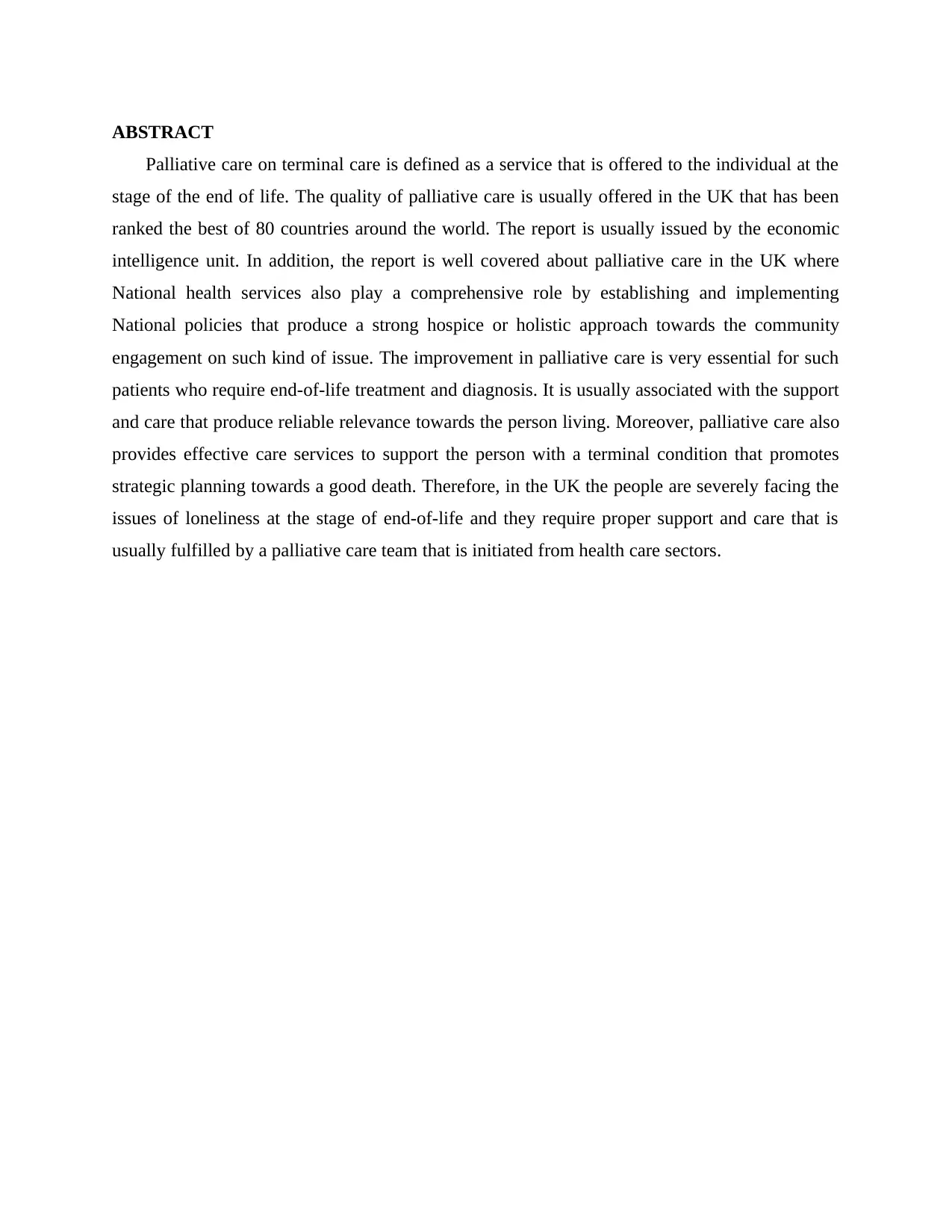
ABSTRACT
Palliative care on terminal care is defined as a service that is offered to the individual at the
stage of the end of life. The quality of palliative care is usually offered in the UK that has been
ranked the best of 80 countries around the world. The report is usually issued by the economic
intelligence unit. In addition, the report is well covered about palliative care in the UK where
National health services also play a comprehensive role by establishing and implementing
National policies that produce a strong hospice or holistic approach towards the community
engagement on such kind of issue. The improvement in palliative care is very essential for such
patients who require end-of-life treatment and diagnosis. It is usually associated with the support
and care that produce reliable relevance towards the person living. Moreover, palliative care also
provides effective care services to support the person with a terminal condition that promotes
strategic planning towards a good death. Therefore, in the UK the people are severely facing the
issues of loneliness at the stage of end-of-life and they require proper support and care that is
usually fulfilled by a palliative care team that is initiated from health care sectors.
Palliative care on terminal care is defined as a service that is offered to the individual at the
stage of the end of life. The quality of palliative care is usually offered in the UK that has been
ranked the best of 80 countries around the world. The report is usually issued by the economic
intelligence unit. In addition, the report is well covered about palliative care in the UK where
National health services also play a comprehensive role by establishing and implementing
National policies that produce a strong hospice or holistic approach towards the community
engagement on such kind of issue. The improvement in palliative care is very essential for such
patients who require end-of-life treatment and diagnosis. It is usually associated with the support
and care that produce reliable relevance towards the person living. Moreover, palliative care also
provides effective care services to support the person with a terminal condition that promotes
strategic planning towards a good death. Therefore, in the UK the people are severely facing the
issues of loneliness at the stage of end-of-life and they require proper support and care that is
usually fulfilled by a palliative care team that is initiated from health care sectors.
⊘ This is a preview!⊘
Do you want full access?
Subscribe today to unlock all pages.

Trusted by 1+ million students worldwide
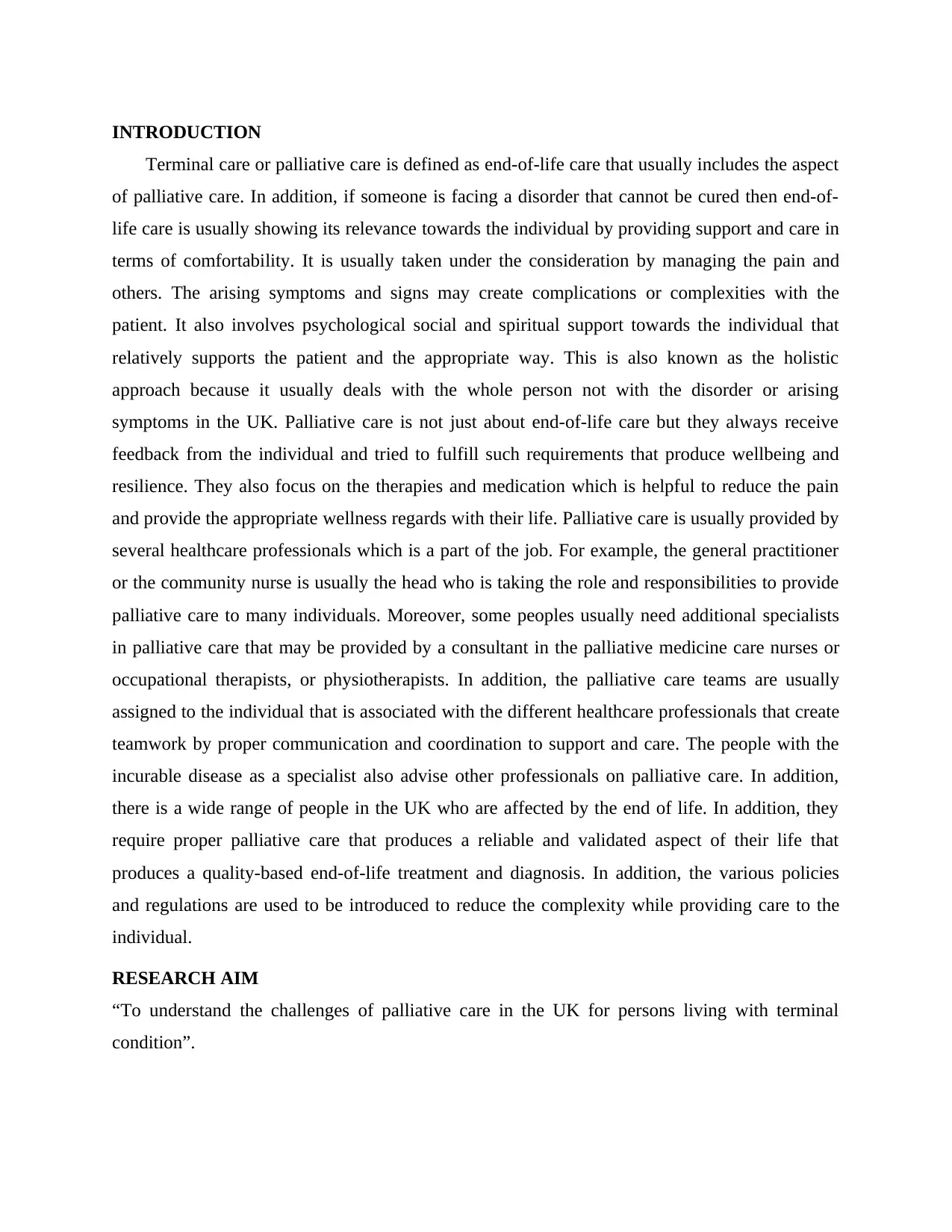
INTRODUCTION
Terminal care or palliative care is defined as end-of-life care that usually includes the aspect
of palliative care. In addition, if someone is facing a disorder that cannot be cured then end-of-
life care is usually showing its relevance towards the individual by providing support and care in
terms of comfortability. It is usually taken under the consideration by managing the pain and
others. The arising symptoms and signs may create complications or complexities with the
patient. It also involves psychological social and spiritual support towards the individual that
relatively supports the patient and the appropriate way. This is also known as the holistic
approach because it usually deals with the whole person not with the disorder or arising
symptoms in the UK. Palliative care is not just about end-of-life care but they always receive
feedback from the individual and tried to fulfill such requirements that produce wellbeing and
resilience. They also focus on the therapies and medication which is helpful to reduce the pain
and provide the appropriate wellness regards with their life. Palliative care is usually provided by
several healthcare professionals which is a part of the job. For example, the general practitioner
or the community nurse is usually the head who is taking the role and responsibilities to provide
palliative care to many individuals. Moreover, some peoples usually need additional specialists
in palliative care that may be provided by a consultant in the palliative medicine care nurses or
occupational therapists, or physiotherapists. In addition, the palliative care teams are usually
assigned to the individual that is associated with the different healthcare professionals that create
teamwork by proper communication and coordination to support and care. The people with the
incurable disease as a specialist also advise other professionals on palliative care. In addition,
there is a wide range of people in the UK who are affected by the end of life. In addition, they
require proper palliative care that produces a reliable and validated aspect of their life that
produces a quality-based end-of-life treatment and diagnosis. In addition, the various policies
and regulations are used to be introduced to reduce the complexity while providing care to the
individual.
RESEARCH AIM
“To understand the challenges of palliative care in the UK for persons living with terminal
condition”.
Terminal care or palliative care is defined as end-of-life care that usually includes the aspect
of palliative care. In addition, if someone is facing a disorder that cannot be cured then end-of-
life care is usually showing its relevance towards the individual by providing support and care in
terms of comfortability. It is usually taken under the consideration by managing the pain and
others. The arising symptoms and signs may create complications or complexities with the
patient. It also involves psychological social and spiritual support towards the individual that
relatively supports the patient and the appropriate way. This is also known as the holistic
approach because it usually deals with the whole person not with the disorder or arising
symptoms in the UK. Palliative care is not just about end-of-life care but they always receive
feedback from the individual and tried to fulfill such requirements that produce wellbeing and
resilience. They also focus on the therapies and medication which is helpful to reduce the pain
and provide the appropriate wellness regards with their life. Palliative care is usually provided by
several healthcare professionals which is a part of the job. For example, the general practitioner
or the community nurse is usually the head who is taking the role and responsibilities to provide
palliative care to many individuals. Moreover, some peoples usually need additional specialists
in palliative care that may be provided by a consultant in the palliative medicine care nurses or
occupational therapists, or physiotherapists. In addition, the palliative care teams are usually
assigned to the individual that is associated with the different healthcare professionals that create
teamwork by proper communication and coordination to support and care. The people with the
incurable disease as a specialist also advise other professionals on palliative care. In addition,
there is a wide range of people in the UK who are affected by the end of life. In addition, they
require proper palliative care that produces a reliable and validated aspect of their life that
produces a quality-based end-of-life treatment and diagnosis. In addition, the various policies
and regulations are used to be introduced to reduce the complexity while providing care to the
individual.
RESEARCH AIM
“To understand the challenges of palliative care in the UK for persons living with terminal
condition”.
Paraphrase This Document
Need a fresh take? Get an instant paraphrase of this document with our AI Paraphraser
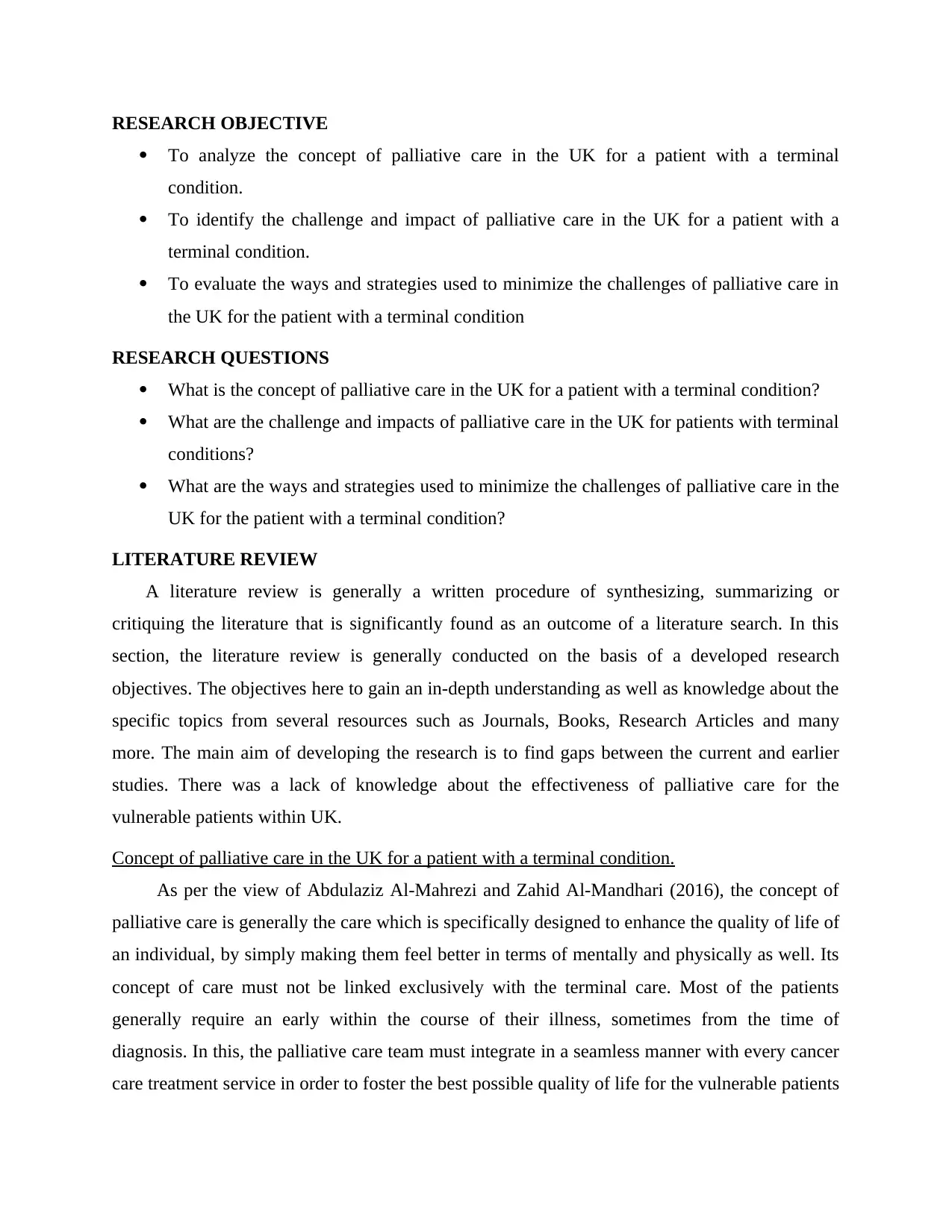
RESEARCH OBJECTIVE
To analyze the concept of palliative care in the UK for a patient with a terminal
condition.
To identify the challenge and impact of palliative care in the UK for a patient with a
terminal condition.
To evaluate the ways and strategies used to minimize the challenges of palliative care in
the UK for the patient with a terminal condition
RESEARCH QUESTIONS
What is the concept of palliative care in the UK for a patient with a terminal condition?
What are the challenge and impacts of palliative care in the UK for patients with terminal
conditions?
What are the ways and strategies used to minimize the challenges of palliative care in the
UK for the patient with a terminal condition?
LITERATURE REVIEW
A literature review is generally a written procedure of synthesizing, summarizing or
critiquing the literature that is significantly found as an outcome of a literature search. In this
section, the literature review is generally conducted on the basis of a developed research
objectives. The objectives here to gain an in-depth understanding as well as knowledge about the
specific topics from several resources such as Journals, Books, Research Articles and many
more. The main aim of developing the research is to find gaps between the current and earlier
studies. There was a lack of knowledge about the effectiveness of palliative care for the
vulnerable patients within UK.
Concept of palliative care in the UK for a patient with a terminal condition.
As per the view of Abdulaziz Al-Mahrezi and Zahid Al-Mandhari (2016), the concept of
palliative care is generally the care which is specifically designed to enhance the quality of life of
an individual, by simply making them feel better in terms of mentally and physically as well. Its
concept of care must not be linked exclusively with the terminal care. Most of the patients
generally require an early within the course of their illness, sometimes from the time of
diagnosis. In this, the palliative care team must integrate in a seamless manner with every cancer
care treatment service in order to foster the best possible quality of life for the vulnerable patients
To analyze the concept of palliative care in the UK for a patient with a terminal
condition.
To identify the challenge and impact of palliative care in the UK for a patient with a
terminal condition.
To evaluate the ways and strategies used to minimize the challenges of palliative care in
the UK for the patient with a terminal condition
RESEARCH QUESTIONS
What is the concept of palliative care in the UK for a patient with a terminal condition?
What are the challenge and impacts of palliative care in the UK for patients with terminal
conditions?
What are the ways and strategies used to minimize the challenges of palliative care in the
UK for the patient with a terminal condition?
LITERATURE REVIEW
A literature review is generally a written procedure of synthesizing, summarizing or
critiquing the literature that is significantly found as an outcome of a literature search. In this
section, the literature review is generally conducted on the basis of a developed research
objectives. The objectives here to gain an in-depth understanding as well as knowledge about the
specific topics from several resources such as Journals, Books, Research Articles and many
more. The main aim of developing the research is to find gaps between the current and earlier
studies. There was a lack of knowledge about the effectiveness of palliative care for the
vulnerable patients within UK.
Concept of palliative care in the UK for a patient with a terminal condition.
As per the view of Abdulaziz Al-Mahrezi and Zahid Al-Mandhari (2016), the concept of
palliative care is generally the care which is specifically designed to enhance the quality of life of
an individual, by simply making them feel better in terms of mentally and physically as well. Its
concept of care must not be linked exclusively with the terminal care. Most of the patients
generally require an early within the course of their illness, sometimes from the time of
diagnosis. In this, the palliative care team must integrate in a seamless manner with every cancer
care treatment service in order to foster the best possible quality of life for the vulnerable patients
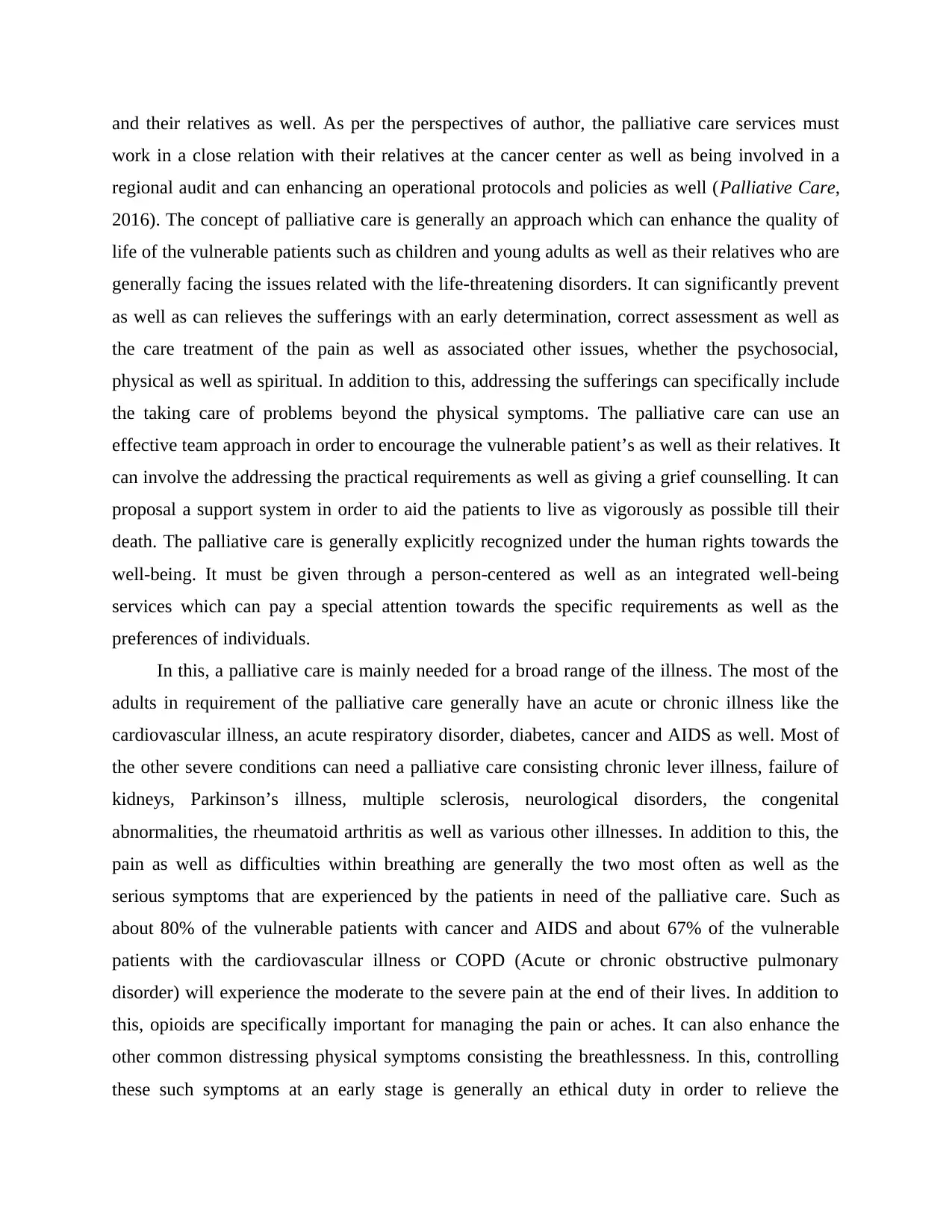
and their relatives as well. As per the perspectives of author, the palliative care services must
work in a close relation with their relatives at the cancer center as well as being involved in a
regional audit and can enhancing an operational protocols and policies as well (Palliative Care,
2016). The concept of palliative care is generally an approach which can enhance the quality of
life of the vulnerable patients such as children and young adults as well as their relatives who are
generally facing the issues related with the life-threatening disorders. It can significantly prevent
as well as can relieves the sufferings with an early determination, correct assessment as well as
the care treatment of the pain as well as associated other issues, whether the psychosocial,
physical as well as spiritual. In addition to this, addressing the sufferings can specifically include
the taking care of problems beyond the physical symptoms. The palliative care can use an
effective team approach in order to encourage the vulnerable patient’s as well as their relatives. It
can involve the addressing the practical requirements as well as giving a grief counselling. It can
proposal a support system in order to aid the patients to live as vigorously as possible till their
death. The palliative care is generally explicitly recognized under the human rights towards the
well-being. It must be given through a person-centered as well as an integrated well-being
services which can pay a special attention towards the specific requirements as well as the
preferences of individuals.
In this, a palliative care is mainly needed for a broad range of the illness. The most of the
adults in requirement of the palliative care generally have an acute or chronic illness like the
cardiovascular illness, an acute respiratory disorder, diabetes, cancer and AIDS as well. Most of
the other severe conditions can need a palliative care consisting chronic lever illness, failure of
kidneys, Parkinson’s illness, multiple sclerosis, neurological disorders, the congenital
abnormalities, the rheumatoid arthritis as well as various other illnesses. In addition to this, the
pain as well as difficulties within breathing are generally the two most often as well as the
serious symptoms that are experienced by the patients in need of the palliative care. Such as
about 80% of the vulnerable patients with cancer and AIDS and about 67% of the vulnerable
patients with the cardiovascular illness or COPD (Acute or chronic obstructive pulmonary
disorder) will experience the moderate to the severe pain at the end of their lives. In addition to
this, opioids are specifically important for managing the pain or aches. It can also enhance the
other common distressing physical symptoms consisting the breathlessness. In this, controlling
these such symptoms at an early stage is generally an ethical duty in order to relieve the
work in a close relation with their relatives at the cancer center as well as being involved in a
regional audit and can enhancing an operational protocols and policies as well (Palliative Care,
2016). The concept of palliative care is generally an approach which can enhance the quality of
life of the vulnerable patients such as children and young adults as well as their relatives who are
generally facing the issues related with the life-threatening disorders. It can significantly prevent
as well as can relieves the sufferings with an early determination, correct assessment as well as
the care treatment of the pain as well as associated other issues, whether the psychosocial,
physical as well as spiritual. In addition to this, addressing the sufferings can specifically include
the taking care of problems beyond the physical symptoms. The palliative care can use an
effective team approach in order to encourage the vulnerable patient’s as well as their relatives. It
can involve the addressing the practical requirements as well as giving a grief counselling. It can
proposal a support system in order to aid the patients to live as vigorously as possible till their
death. The palliative care is generally explicitly recognized under the human rights towards the
well-being. It must be given through a person-centered as well as an integrated well-being
services which can pay a special attention towards the specific requirements as well as the
preferences of individuals.
In this, a palliative care is mainly needed for a broad range of the illness. The most of the
adults in requirement of the palliative care generally have an acute or chronic illness like the
cardiovascular illness, an acute respiratory disorder, diabetes, cancer and AIDS as well. Most of
the other severe conditions can need a palliative care consisting chronic lever illness, failure of
kidneys, Parkinson’s illness, multiple sclerosis, neurological disorders, the congenital
abnormalities, the rheumatoid arthritis as well as various other illnesses. In addition to this, the
pain as well as difficulties within breathing are generally the two most often as well as the
serious symptoms that are experienced by the patients in need of the palliative care. Such as
about 80% of the vulnerable patients with cancer and AIDS and about 67% of the vulnerable
patients with the cardiovascular illness or COPD (Acute or chronic obstructive pulmonary
disorder) will experience the moderate to the severe pain at the end of their lives. In addition to
this, opioids are specifically important for managing the pain or aches. It can also enhance the
other common distressing physical symptoms consisting the breathlessness. In this, controlling
these such symptoms at an early stage is generally an ethical duty in order to relieve the
⊘ This is a preview!⊘
Do you want full access?
Subscribe today to unlock all pages.

Trusted by 1+ million students worldwide
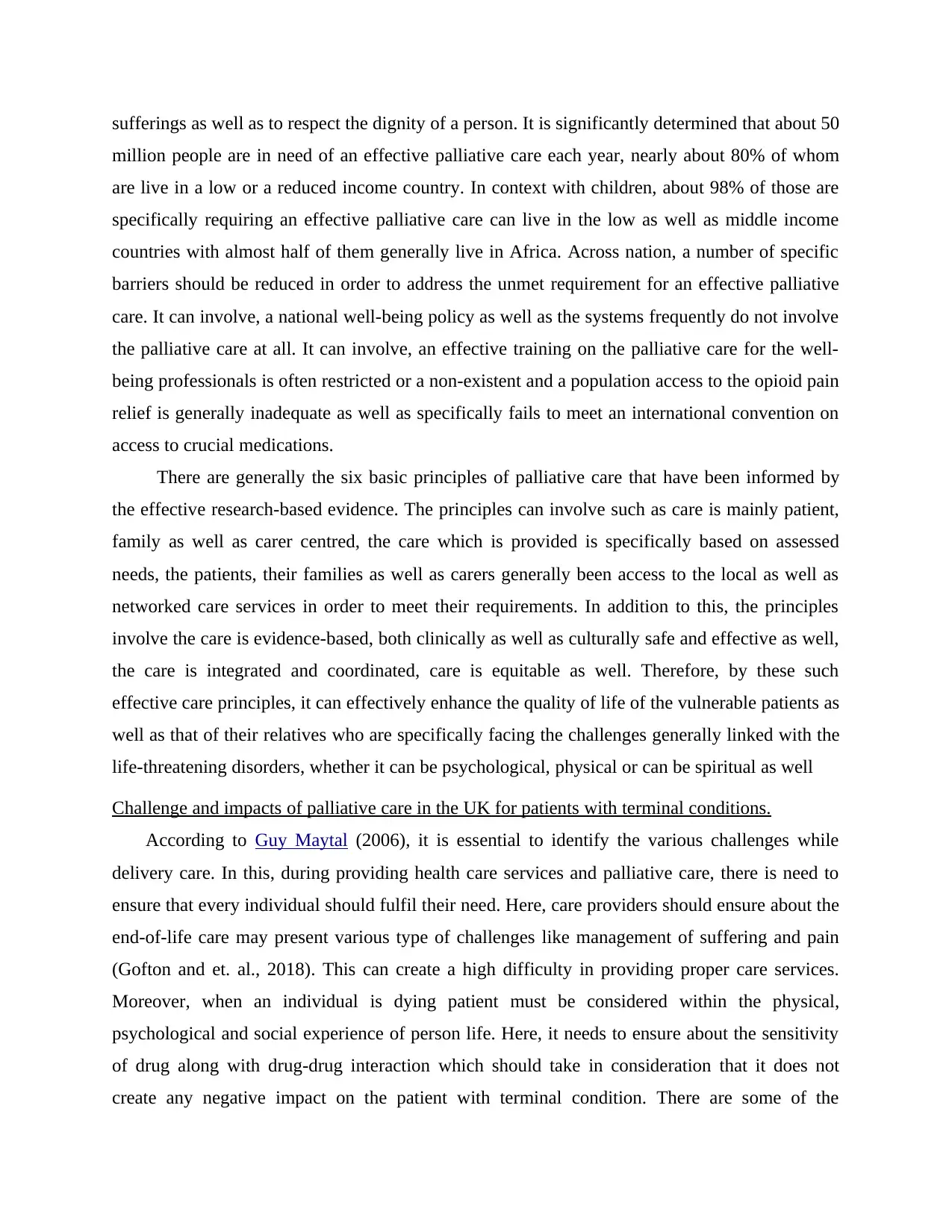
sufferings as well as to respect the dignity of a person. It is significantly determined that about 50
million people are in need of an effective palliative care each year, nearly about 80% of whom
are live in a low or a reduced income country. In context with children, about 98% of those are
specifically requiring an effective palliative care can live in the low as well as middle income
countries with almost half of them generally live in Africa. Across nation, a number of specific
barriers should be reduced in order to address the unmet requirement for an effective palliative
care. It can involve, a national well-being policy as well as the systems frequently do not involve
the palliative care at all. It can involve, an effective training on the palliative care for the well-
being professionals is often restricted or a non-existent and a population access to the opioid pain
relief is generally inadequate as well as specifically fails to meet an international convention on
access to crucial medications.
There are generally the six basic principles of palliative care that have been informed by
the effective research-based evidence. The principles can involve such as care is mainly patient,
family as well as carer centred, the care which is provided is specifically based on assessed
needs, the patients, their families as well as carers generally been access to the local as well as
networked care services in order to meet their requirements. In addition to this, the principles
involve the care is evidence-based, both clinically as well as culturally safe and effective as well,
the care is integrated and coordinated, care is equitable as well. Therefore, by these such
effective care principles, it can effectively enhance the quality of life of the vulnerable patients as
well as that of their relatives who are specifically facing the challenges generally linked with the
life-threatening disorders, whether it can be psychological, physical or can be spiritual as well
Challenge and impacts of palliative care in the UK for patients with terminal conditions.
According to Guy Maytal (2006), it is essential to identify the various challenges while
delivery care. In this, during providing health care services and palliative care, there is need to
ensure that every individual should fulfil their need. Here, care providers should ensure about the
end-of-life care may present various type of challenges like management of suffering and pain
(Gofton and et. al., 2018). This can create a high difficulty in providing proper care services.
Moreover, when an individual is dying patient must be considered within the physical,
psychological and social experience of person life. Here, it needs to ensure about the sensitivity
of drug along with drug-drug interaction which should take in consideration that it does not
create any negative impact on the patient with terminal condition. There are some of the
million people are in need of an effective palliative care each year, nearly about 80% of whom
are live in a low or a reduced income country. In context with children, about 98% of those are
specifically requiring an effective palliative care can live in the low as well as middle income
countries with almost half of them generally live in Africa. Across nation, a number of specific
barriers should be reduced in order to address the unmet requirement for an effective palliative
care. It can involve, a national well-being policy as well as the systems frequently do not involve
the palliative care at all. It can involve, an effective training on the palliative care for the well-
being professionals is often restricted or a non-existent and a population access to the opioid pain
relief is generally inadequate as well as specifically fails to meet an international convention on
access to crucial medications.
There are generally the six basic principles of palliative care that have been informed by
the effective research-based evidence. The principles can involve such as care is mainly patient,
family as well as carer centred, the care which is provided is specifically based on assessed
needs, the patients, their families as well as carers generally been access to the local as well as
networked care services in order to meet their requirements. In addition to this, the principles
involve the care is evidence-based, both clinically as well as culturally safe and effective as well,
the care is integrated and coordinated, care is equitable as well. Therefore, by these such
effective care principles, it can effectively enhance the quality of life of the vulnerable patients as
well as that of their relatives who are specifically facing the challenges generally linked with the
life-threatening disorders, whether it can be psychological, physical or can be spiritual as well
Challenge and impacts of palliative care in the UK for patients with terminal conditions.
According to Guy Maytal (2006), it is essential to identify the various challenges while
delivery care. In this, during providing health care services and palliative care, there is need to
ensure that every individual should fulfil their need. Here, care providers should ensure about the
end-of-life care may present various type of challenges like management of suffering and pain
(Gofton and et. al., 2018). This can create a high difficulty in providing proper care services.
Moreover, when an individual is dying patient must be considered within the physical,
psychological and social experience of person life. Here, it needs to ensure about the sensitivity
of drug along with drug-drug interaction which should take in consideration that it does not
create any negative impact on the patient with terminal condition. There are some of the
Paraphrase This Document
Need a fresh take? Get an instant paraphrase of this document with our AI Paraphraser
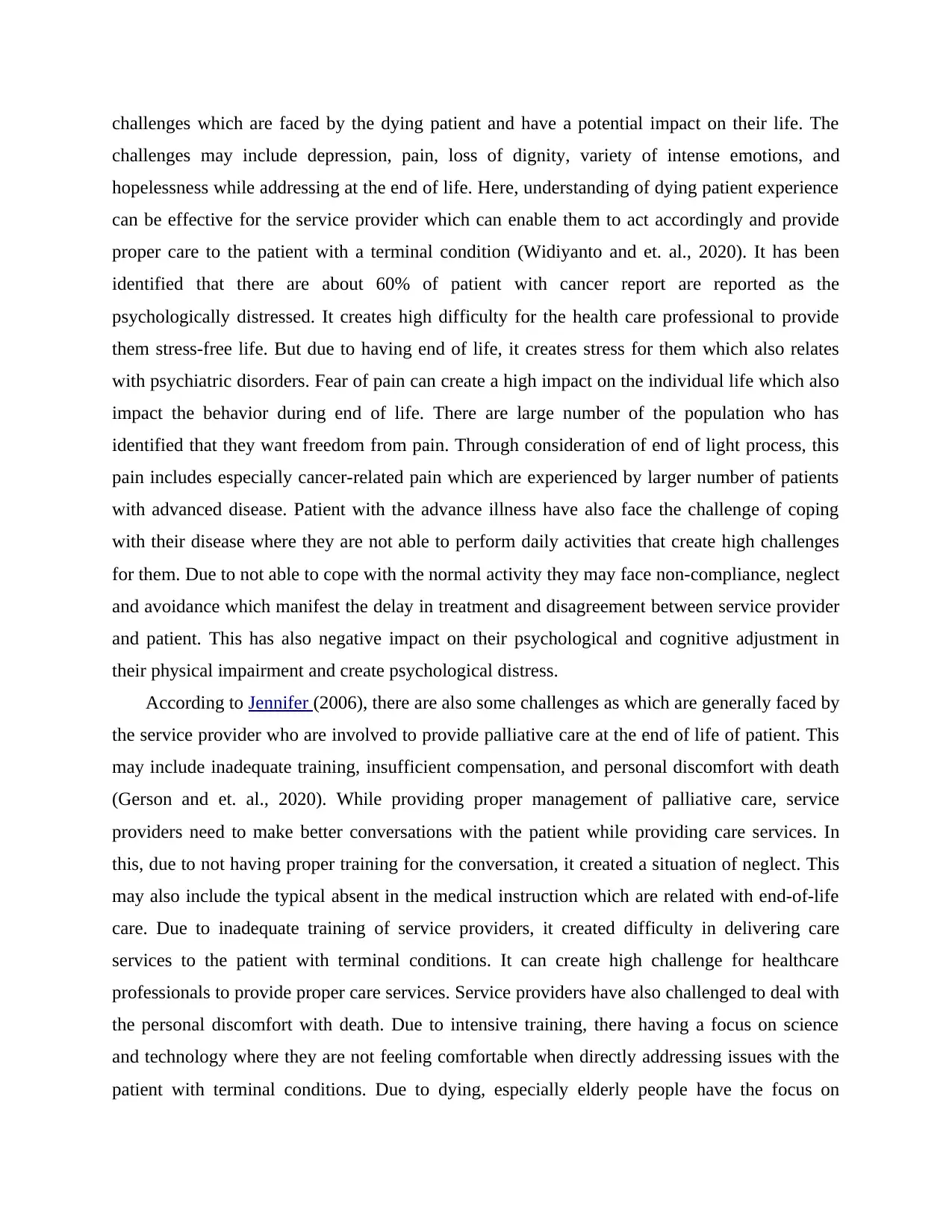
challenges which are faced by the dying patient and have a potential impact on their life. The
challenges may include depression, pain, loss of dignity, variety of intense emotions, and
hopelessness while addressing at the end of life. Here, understanding of dying patient experience
can be effective for the service provider which can enable them to act accordingly and provide
proper care to the patient with a terminal condition (Widiyanto and et. al., 2020). It has been
identified that there are about 60% of patient with cancer report are reported as the
psychologically distressed. It creates high difficulty for the health care professional to provide
them stress-free life. But due to having end of life, it creates stress for them which also relates
with psychiatric disorders. Fear of pain can create a high impact on the individual life which also
impact the behavior during end of life. There are large number of the population who has
identified that they want freedom from pain. Through consideration of end of light process, this
pain includes especially cancer-related pain which are experienced by larger number of patients
with advanced disease. Patient with the advance illness have also face the challenge of coping
with their disease where they are not able to perform daily activities that create high challenges
for them. Due to not able to cope with the normal activity they may face non-compliance, neglect
and avoidance which manifest the delay in treatment and disagreement between service provider
and patient. This has also negative impact on their psychological and cognitive adjustment in
their physical impairment and create psychological distress.
According to Jennifer (2006), there are also some challenges as which are generally faced by
the service provider who are involved to provide palliative care at the end of life of patient. This
may include inadequate training, insufficient compensation, and personal discomfort with death
(Gerson and et. al., 2020). While providing proper management of palliative care, service
providers need to make better conversations with the patient while providing care services. In
this, due to not having proper training for the conversation, it created a situation of neglect. This
may also include the typical absent in the medical instruction which are related with end-of-life
care. Due to inadequate training of service providers, it created difficulty in delivering care
services to the patient with terminal conditions. It can create high challenge for healthcare
professionals to provide proper care services. Service providers have also challenged to deal with
the personal discomfort with death. Due to intensive training, there having a focus on science
and technology where they are not feeling comfortable when directly addressing issues with the
patient with terminal conditions. Due to dying, especially elderly people have the focus on
challenges may include depression, pain, loss of dignity, variety of intense emotions, and
hopelessness while addressing at the end of life. Here, understanding of dying patient experience
can be effective for the service provider which can enable them to act accordingly and provide
proper care to the patient with a terminal condition (Widiyanto and et. al., 2020). It has been
identified that there are about 60% of patient with cancer report are reported as the
psychologically distressed. It creates high difficulty for the health care professional to provide
them stress-free life. But due to having end of life, it creates stress for them which also relates
with psychiatric disorders. Fear of pain can create a high impact on the individual life which also
impact the behavior during end of life. There are large number of the population who has
identified that they want freedom from pain. Through consideration of end of light process, this
pain includes especially cancer-related pain which are experienced by larger number of patients
with advanced disease. Patient with the advance illness have also face the challenge of coping
with their disease where they are not able to perform daily activities that create high challenges
for them. Due to not able to cope with the normal activity they may face non-compliance, neglect
and avoidance which manifest the delay in treatment and disagreement between service provider
and patient. This has also negative impact on their psychological and cognitive adjustment in
their physical impairment and create psychological distress.
According to Jennifer (2006), there are also some challenges as which are generally faced by
the service provider who are involved to provide palliative care at the end of life of patient. This
may include inadequate training, insufficient compensation, and personal discomfort with death
(Gerson and et. al., 2020). While providing proper management of palliative care, service
providers need to make better conversations with the patient while providing care services. In
this, due to not having proper training for the conversation, it created a situation of neglect. This
may also include the typical absent in the medical instruction which are related with end-of-life
care. Due to inadequate training of service providers, it created difficulty in delivering care
services to the patient with terminal conditions. It can create high challenge for healthcare
professionals to provide proper care services. Service providers have also challenged to deal with
the personal discomfort with death. Due to intensive training, there having a focus on science
and technology where they are not feeling comfortable when directly addressing issues with the
patient with terminal conditions. Due to dying, especially elderly people have the focus on
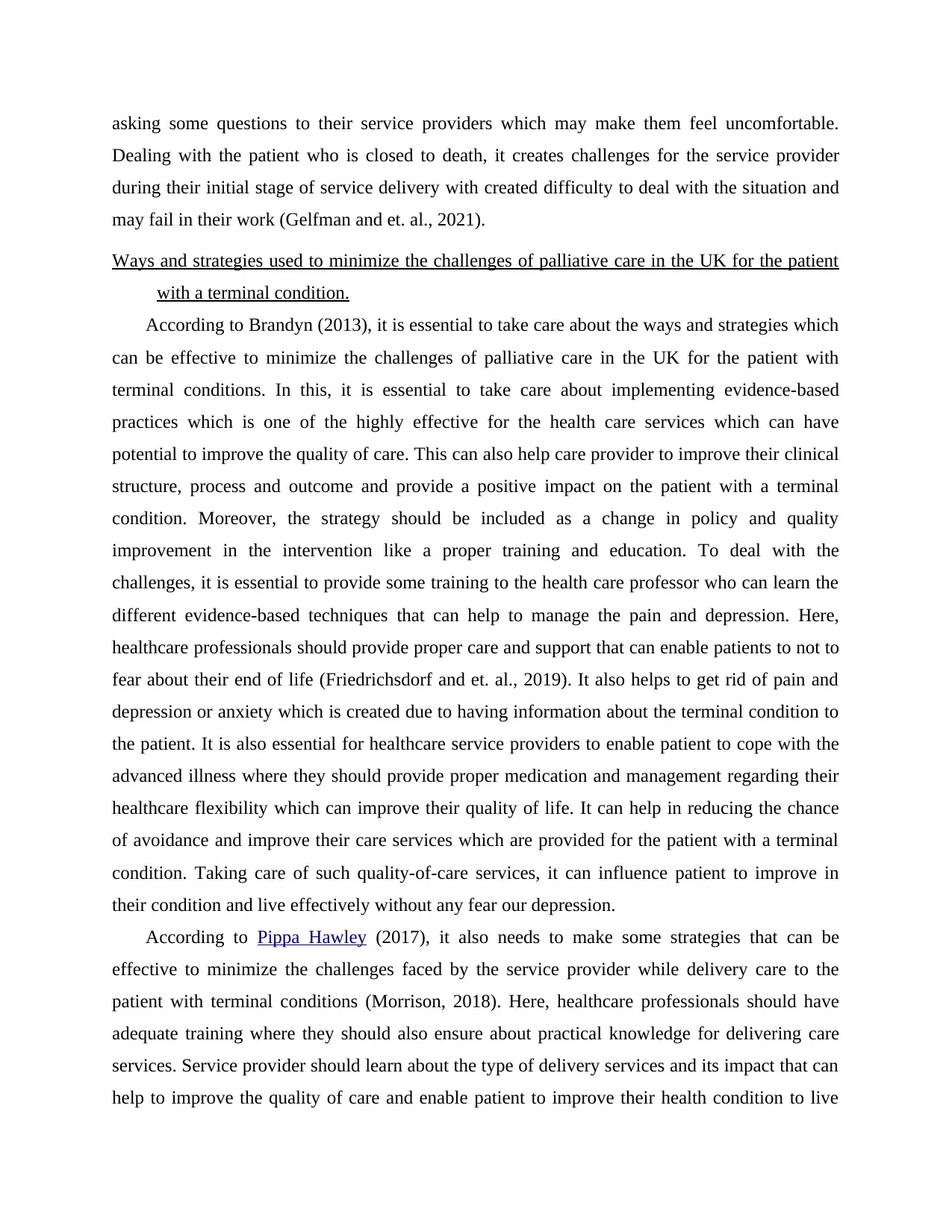
asking some questions to their service providers which may make them feel uncomfortable.
Dealing with the patient who is closed to death, it creates challenges for the service provider
during their initial stage of service delivery with created difficulty to deal with the situation and
may fail in their work (Gelfman and et. al., 2021).
Ways and strategies used to minimize the challenges of palliative care in the UK for the patient
with a terminal condition.
According to Brandyn (2013), it is essential to take care about the ways and strategies which
can be effective to minimize the challenges of palliative care in the UK for the patient with
terminal conditions. In this, it is essential to take care about implementing evidence-based
practices which is one of the highly effective for the health care services which can have
potential to improve the quality of care. This can also help care provider to improve their clinical
structure, process and outcome and provide a positive impact on the patient with a terminal
condition. Moreover, the strategy should be included as a change in policy and quality
improvement in the intervention like a proper training and education. To deal with the
challenges, it is essential to provide some training to the health care professor who can learn the
different evidence-based techniques that can help to manage the pain and depression. Here,
healthcare professionals should provide proper care and support that can enable patients to not to
fear about their end of life (Friedrichsdorf and et. al., 2019). It also helps to get rid of pain and
depression or anxiety which is created due to having information about the terminal condition to
the patient. It is also essential for healthcare service providers to enable patient to cope with the
advanced illness where they should provide proper medication and management regarding their
healthcare flexibility which can improve their quality of life. It can help in reducing the chance
of avoidance and improve their care services which are provided for the patient with a terminal
condition. Taking care of such quality-of-care services, it can influence patient to improve in
their condition and live effectively without any fear our depression.
According to Pippa Hawley (2017), it also needs to make some strategies that can be
effective to minimize the challenges faced by the service provider while delivery care to the
patient with terminal conditions (Morrison, 2018). Here, healthcare professionals should have
adequate training where they should also ensure about practical knowledge for delivering care
services. Service provider should learn about the type of delivery services and its impact that can
help to improve the quality of care and enable patient to improve their health condition to live
Dealing with the patient who is closed to death, it creates challenges for the service provider
during their initial stage of service delivery with created difficulty to deal with the situation and
may fail in their work (Gelfman and et. al., 2021).
Ways and strategies used to minimize the challenges of palliative care in the UK for the patient
with a terminal condition.
According to Brandyn (2013), it is essential to take care about the ways and strategies which
can be effective to minimize the challenges of palliative care in the UK for the patient with
terminal conditions. In this, it is essential to take care about implementing evidence-based
practices which is one of the highly effective for the health care services which can have
potential to improve the quality of care. This can also help care provider to improve their clinical
structure, process and outcome and provide a positive impact on the patient with a terminal
condition. Moreover, the strategy should be included as a change in policy and quality
improvement in the intervention like a proper training and education. To deal with the
challenges, it is essential to provide some training to the health care professor who can learn the
different evidence-based techniques that can help to manage the pain and depression. Here,
healthcare professionals should provide proper care and support that can enable patients to not to
fear about their end of life (Friedrichsdorf and et. al., 2019). It also helps to get rid of pain and
depression or anxiety which is created due to having information about the terminal condition to
the patient. It is also essential for healthcare service providers to enable patient to cope with the
advanced illness where they should provide proper medication and management regarding their
healthcare flexibility which can improve their quality of life. It can help in reducing the chance
of avoidance and improve their care services which are provided for the patient with a terminal
condition. Taking care of such quality-of-care services, it can influence patient to improve in
their condition and live effectively without any fear our depression.
According to Pippa Hawley (2017), it also needs to make some strategies that can be
effective to minimize the challenges faced by the service provider while delivery care to the
patient with terminal conditions (Morrison, 2018). Here, healthcare professionals should have
adequate training where they should also ensure about practical knowledge for delivering care
services. Service provider should learn about the type of delivery services and its impact that can
help to improve the quality of care and enable patient to improve their health condition to live
⊘ This is a preview!⊘
Do you want full access?
Subscribe today to unlock all pages.

Trusted by 1+ million students worldwide
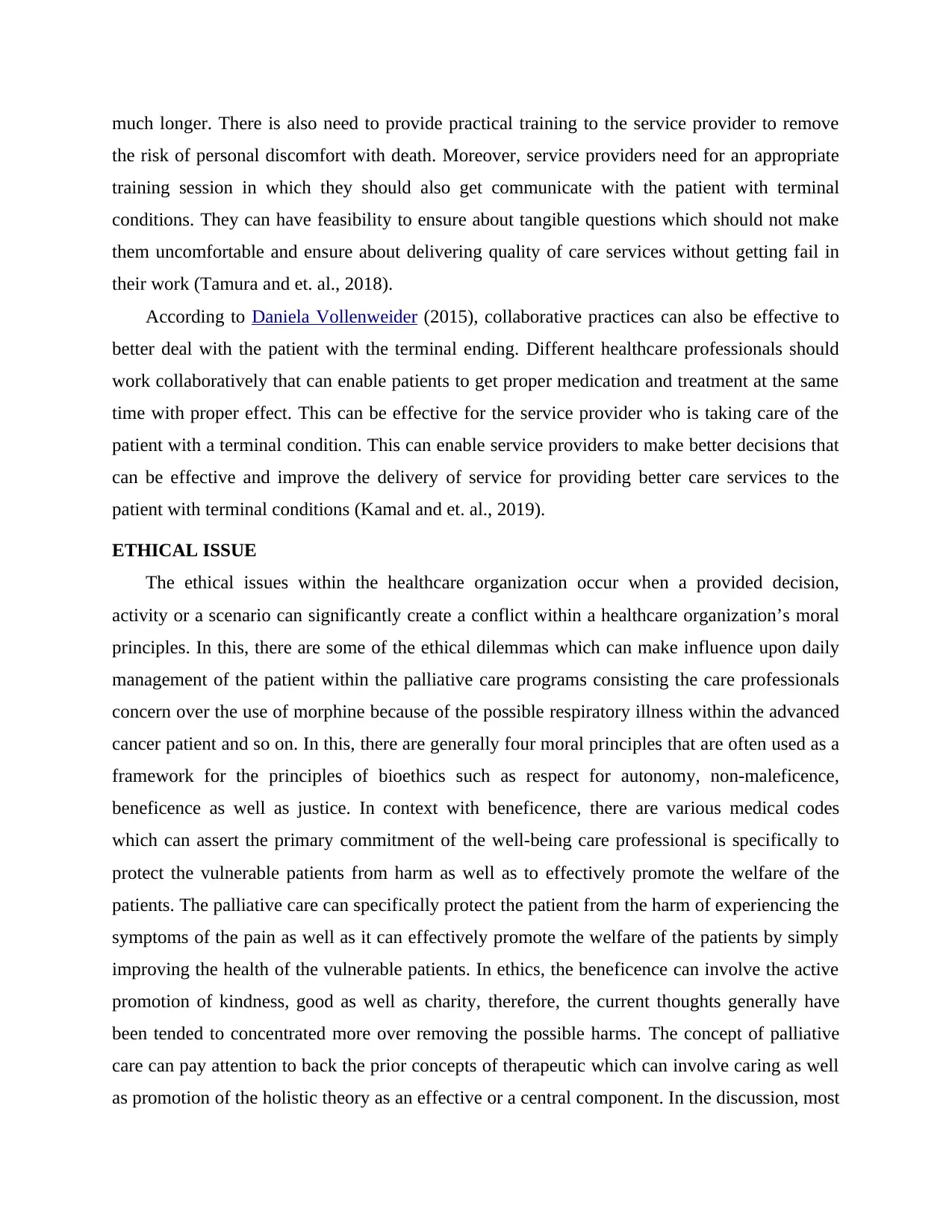
much longer. There is also need to provide practical training to the service provider to remove
the risk of personal discomfort with death. Moreover, service providers need for an appropriate
training session in which they should also get communicate with the patient with terminal
conditions. They can have feasibility to ensure about tangible questions which should not make
them uncomfortable and ensure about delivering quality of care services without getting fail in
their work (Tamura and et. al., 2018).
According to Daniela Vollenweider (2015), collaborative practices can also be effective to
better deal with the patient with the terminal ending. Different healthcare professionals should
work collaboratively that can enable patients to get proper medication and treatment at the same
time with proper effect. This can be effective for the service provider who is taking care of the
patient with a terminal condition. This can enable service providers to make better decisions that
can be effective and improve the delivery of service for providing better care services to the
patient with terminal conditions (Kamal and et. al., 2019).
ETHICAL ISSUE
The ethical issues within the healthcare organization occur when a provided decision,
activity or a scenario can significantly create a conflict within a healthcare organization’s moral
principles. In this, there are some of the ethical dilemmas which can make influence upon daily
management of the patient within the palliative care programs consisting the care professionals
concern over the use of morphine because of the possible respiratory illness within the advanced
cancer patient and so on. In this, there are generally four moral principles that are often used as a
framework for the principles of bioethics such as respect for autonomy, non-maleficence,
beneficence as well as justice. In context with beneficence, there are various medical codes
which can assert the primary commitment of the well-being care professional is specifically to
protect the vulnerable patients from harm as well as to effectively promote the welfare of the
patients. The palliative care can specifically protect the patient from the harm of experiencing the
symptoms of the pain as well as it can effectively promote the welfare of the patients by simply
improving the health of the vulnerable patients. In ethics, the beneficence can involve the active
promotion of kindness, good as well as charity, therefore, the current thoughts generally have
been tended to concentrated more over removing the possible harms. The concept of palliative
care can pay attention to back the prior concepts of therapeutic which can involve caring as well
as promotion of the holistic theory as an effective or a central component. In the discussion, most
the risk of personal discomfort with death. Moreover, service providers need for an appropriate
training session in which they should also get communicate with the patient with terminal
conditions. They can have feasibility to ensure about tangible questions which should not make
them uncomfortable and ensure about delivering quality of care services without getting fail in
their work (Tamura and et. al., 2018).
According to Daniela Vollenweider (2015), collaborative practices can also be effective to
better deal with the patient with the terminal ending. Different healthcare professionals should
work collaboratively that can enable patients to get proper medication and treatment at the same
time with proper effect. This can be effective for the service provider who is taking care of the
patient with a terminal condition. This can enable service providers to make better decisions that
can be effective and improve the delivery of service for providing better care services to the
patient with terminal conditions (Kamal and et. al., 2019).
ETHICAL ISSUE
The ethical issues within the healthcare organization occur when a provided decision,
activity or a scenario can significantly create a conflict within a healthcare organization’s moral
principles. In this, there are some of the ethical dilemmas which can make influence upon daily
management of the patient within the palliative care programs consisting the care professionals
concern over the use of morphine because of the possible respiratory illness within the advanced
cancer patient and so on. In this, there are generally four moral principles that are often used as a
framework for the principles of bioethics such as respect for autonomy, non-maleficence,
beneficence as well as justice. In context with beneficence, there are various medical codes
which can assert the primary commitment of the well-being care professional is specifically to
protect the vulnerable patients from harm as well as to effectively promote the welfare of the
patients. The palliative care can specifically protect the patient from the harm of experiencing the
symptoms of the pain as well as it can effectively promote the welfare of the patients by simply
improving the health of the vulnerable patients. In ethics, the beneficence can involve the active
promotion of kindness, good as well as charity, therefore, the current thoughts generally have
been tended to concentrated more over removing the possible harms. The concept of palliative
care can pay attention to back the prior concepts of therapeutic which can involve caring as well
as promotion of the holistic theory as an effective or a central component. In the discussion, most
Paraphrase This Document
Need a fresh take? Get an instant paraphrase of this document with our AI Paraphraser
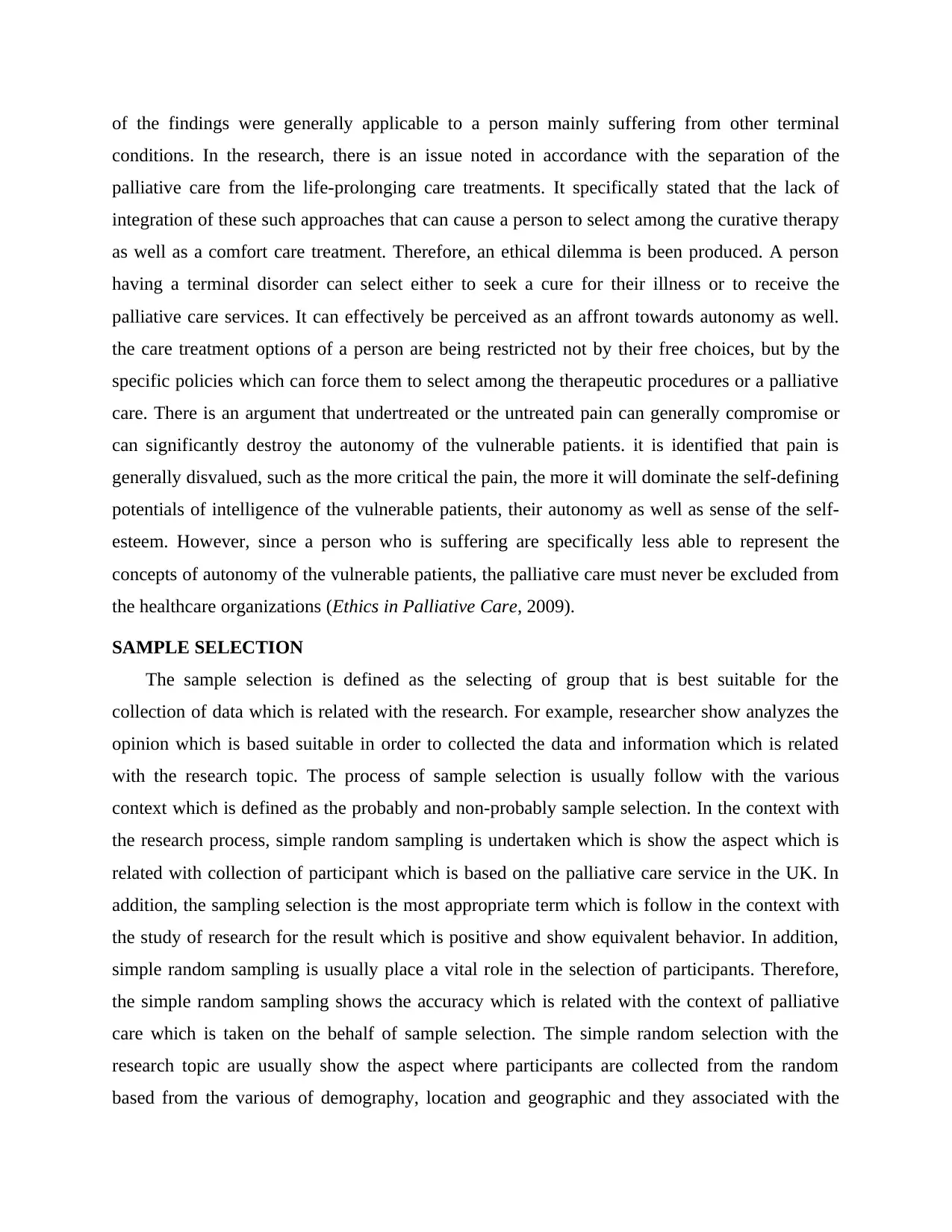
of the findings were generally applicable to a person mainly suffering from other terminal
conditions. In the research, there is an issue noted in accordance with the separation of the
palliative care from the life-prolonging care treatments. It specifically stated that the lack of
integration of these such approaches that can cause a person to select among the curative therapy
as well as a comfort care treatment. Therefore, an ethical dilemma is been produced. A person
having a terminal disorder can select either to seek a cure for their illness or to receive the
palliative care services. It can effectively be perceived as an affront towards autonomy as well.
the care treatment options of a person are being restricted not by their free choices, but by the
specific policies which can force them to select among the therapeutic procedures or a palliative
care. There is an argument that undertreated or the untreated pain can generally compromise or
can significantly destroy the autonomy of the vulnerable patients. it is identified that pain is
generally disvalued, such as the more critical the pain, the more it will dominate the self-defining
potentials of intelligence of the vulnerable patients, their autonomy as well as sense of the self-
esteem. However, since a person who is suffering are specifically less able to represent the
concepts of autonomy of the vulnerable patients, the palliative care must never be excluded from
the healthcare organizations (Ethics in Palliative Care, 2009).
SAMPLE SELECTION
The sample selection is defined as the selecting of group that is best suitable for the
collection of data which is related with the research. For example, researcher show analyzes the
opinion which is based suitable in order to collected the data and information which is related
with the research topic. The process of sample selection is usually follow with the various
context which is defined as the probably and non-probably sample selection. In the context with
the research process, simple random sampling is undertaken which is show the aspect which is
related with collection of participant which is based on the palliative care service in the UK. In
addition, the sampling selection is the most appropriate term which is follow in the context with
the study of research for the result which is positive and show equivalent behavior. In addition,
simple random sampling is usually place a vital role in the selection of participants. Therefore,
the simple random sampling shows the accuracy which is related with the context of palliative
care which is taken on the behalf of sample selection. The simple random selection with the
research topic are usually show the aspect where participants are collected from the random
based from the various of demography, location and geographic and they associated with the
conditions. In the research, there is an issue noted in accordance with the separation of the
palliative care from the life-prolonging care treatments. It specifically stated that the lack of
integration of these such approaches that can cause a person to select among the curative therapy
as well as a comfort care treatment. Therefore, an ethical dilemma is been produced. A person
having a terminal disorder can select either to seek a cure for their illness or to receive the
palliative care services. It can effectively be perceived as an affront towards autonomy as well.
the care treatment options of a person are being restricted not by their free choices, but by the
specific policies which can force them to select among the therapeutic procedures or a palliative
care. There is an argument that undertreated or the untreated pain can generally compromise or
can significantly destroy the autonomy of the vulnerable patients. it is identified that pain is
generally disvalued, such as the more critical the pain, the more it will dominate the self-defining
potentials of intelligence of the vulnerable patients, their autonomy as well as sense of the self-
esteem. However, since a person who is suffering are specifically less able to represent the
concepts of autonomy of the vulnerable patients, the palliative care must never be excluded from
the healthcare organizations (Ethics in Palliative Care, 2009).
SAMPLE SELECTION
The sample selection is defined as the selecting of group that is best suitable for the
collection of data which is related with the research. For example, researcher show analyzes the
opinion which is based suitable in order to collected the data and information which is related
with the research topic. The process of sample selection is usually follow with the various
context which is defined as the probably and non-probably sample selection. In the context with
the research process, simple random sampling is undertaken which is show the aspect which is
related with collection of participant which is based on the palliative care service in the UK. In
addition, the sampling selection is the most appropriate term which is follow in the context with
the study of research for the result which is positive and show equivalent behavior. In addition,
simple random sampling is usually place a vital role in the selection of participants. Therefore,
the simple random sampling shows the accuracy which is related with the context of palliative
care which is taken on the behalf of sample selection. The simple random selection with the
research topic are usually show the aspect where participants are collected from the random
based from the various of demography, location and geographic and they associated with the
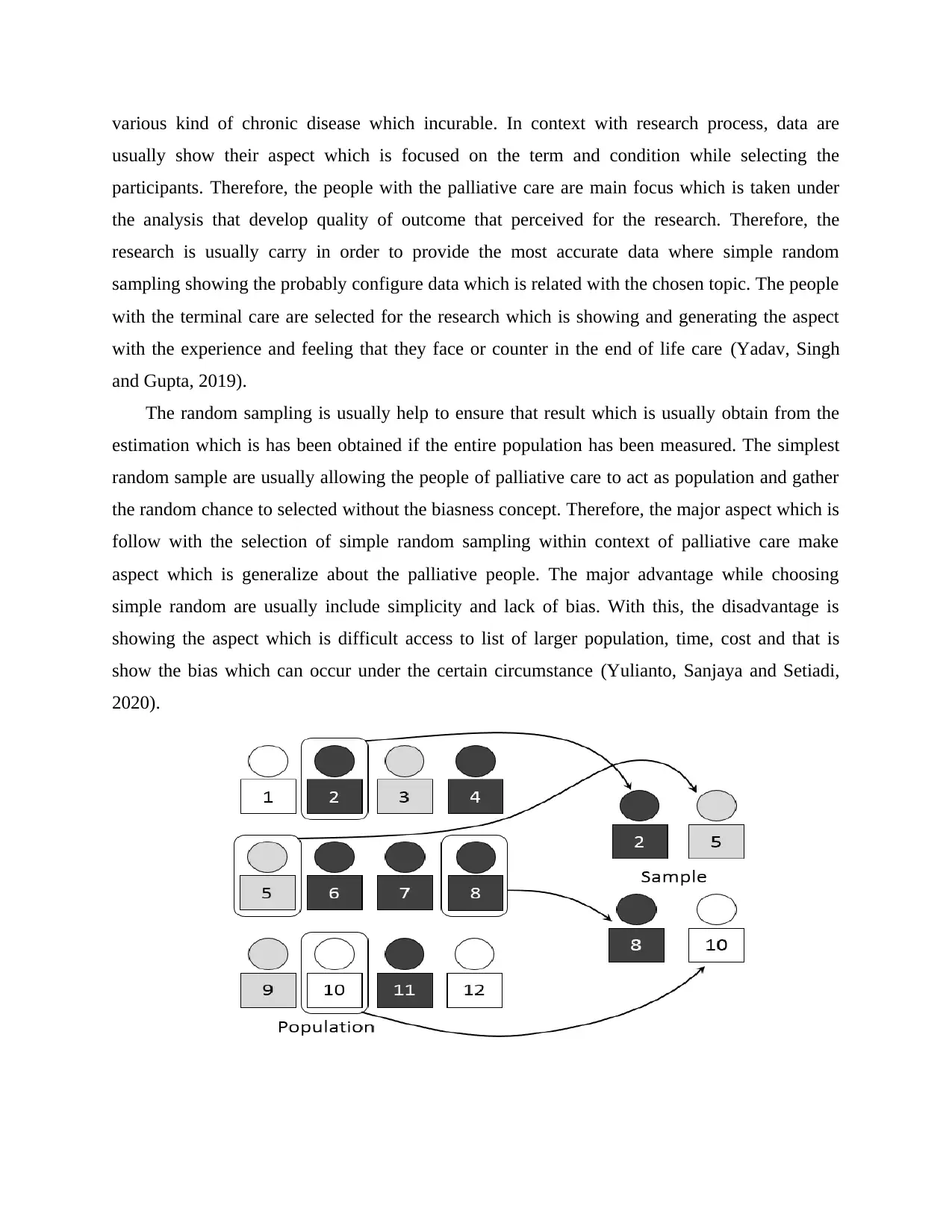
various kind of chronic disease which incurable. In context with research process, data are
usually show their aspect which is focused on the term and condition while selecting the
participants. Therefore, the people with the palliative care are main focus which is taken under
the analysis that develop quality of outcome that perceived for the research. Therefore, the
research is usually carry in order to provide the most accurate data where simple random
sampling showing the probably configure data which is related with the chosen topic. The people
with the terminal care are selected for the research which is showing and generating the aspect
with the experience and feeling that they face or counter in the end of life care (Yadav, Singh
and Gupta, 2019).
The random sampling is usually help to ensure that result which is usually obtain from the
estimation which is has been obtained if the entire population has been measured. The simplest
random sample are usually allowing the people of palliative care to act as population and gather
the random chance to selected without the biasness concept. Therefore, the major aspect which is
follow with the selection of simple random sampling within context of palliative care make
aspect which is generalize about the palliative people. The major advantage while choosing
simple random are usually include simplicity and lack of bias. With this, the disadvantage is
showing the aspect which is difficult access to list of larger population, time, cost and that is
show the bias which can occur under the certain circumstance (Yulianto, Sanjaya and Setiadi,
2020).
usually show their aspect which is focused on the term and condition while selecting the
participants. Therefore, the people with the palliative care are main focus which is taken under
the analysis that develop quality of outcome that perceived for the research. Therefore, the
research is usually carry in order to provide the most accurate data where simple random
sampling showing the probably configure data which is related with the chosen topic. The people
with the terminal care are selected for the research which is showing and generating the aspect
with the experience and feeling that they face or counter in the end of life care (Yadav, Singh
and Gupta, 2019).
The random sampling is usually help to ensure that result which is usually obtain from the
estimation which is has been obtained if the entire population has been measured. The simplest
random sample are usually allowing the people of palliative care to act as population and gather
the random chance to selected without the biasness concept. Therefore, the major aspect which is
follow with the selection of simple random sampling within context of palliative care make
aspect which is generalize about the palliative people. The major advantage while choosing
simple random are usually include simplicity and lack of bias. With this, the disadvantage is
showing the aspect which is difficult access to list of larger population, time, cost and that is
show the bias which can occur under the certain circumstance (Yulianto, Sanjaya and Setiadi,
2020).
⊘ This is a preview!⊘
Do you want full access?
Subscribe today to unlock all pages.

Trusted by 1+ million students worldwide
1 out of 18
Related Documents
Your All-in-One AI-Powered Toolkit for Academic Success.
+13062052269
info@desklib.com
Available 24*7 on WhatsApp / Email
![[object Object]](/_next/static/media/star-bottom.7253800d.svg)
Unlock your academic potential
Copyright © 2020–2026 A2Z Services. All Rights Reserved. Developed and managed by ZUCOL.





